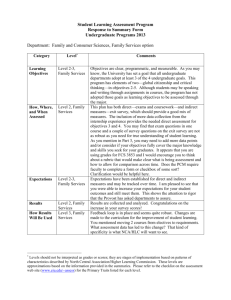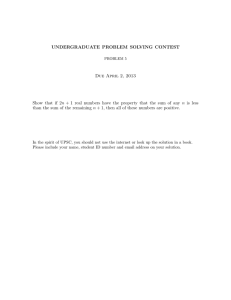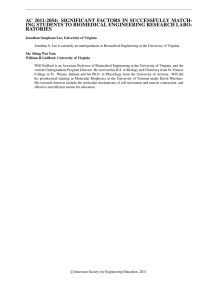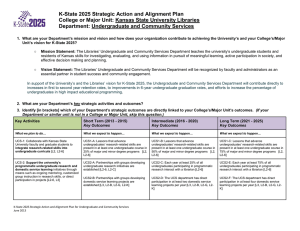Doing research is a key element of learning: undergraduate research
advertisement
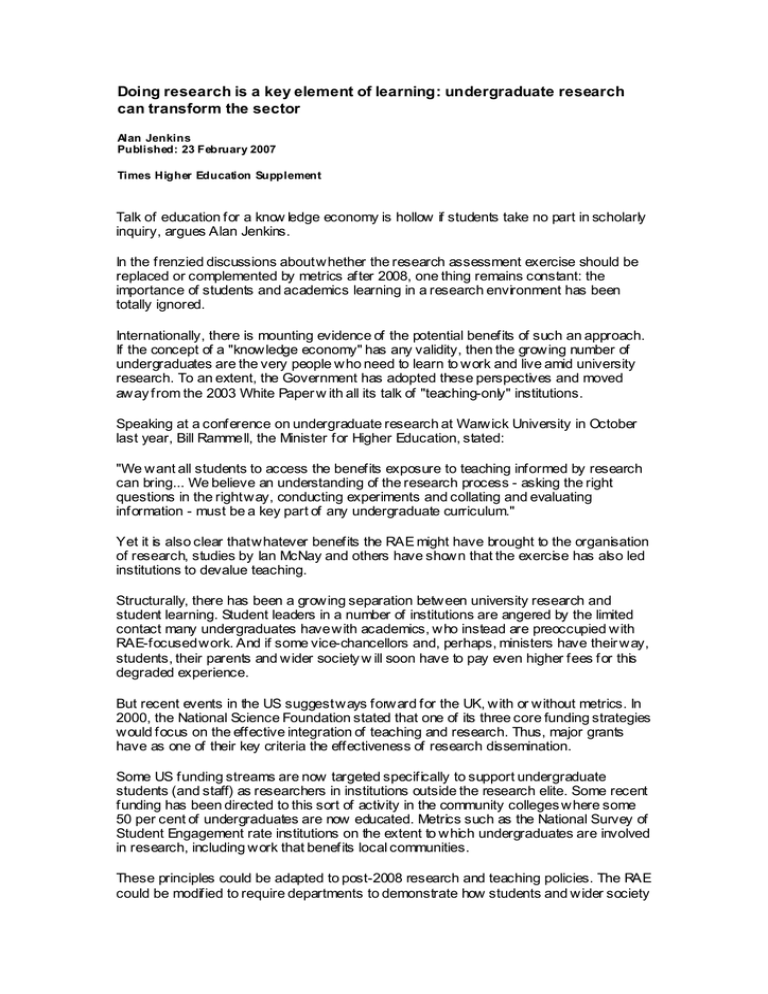
Doing research is a key element of learning: undergraduate research can transform the sector Alan Jenkins Published: 23 February 2007 Times Higher Education Supplement Talk of education for a know ledge economy is hollow if students take no part in scholarly inquiry, argues Alan Jenkins. In the frenzied discussions aboutwhether the research assessment exercise should be replaced or complemented by metrics after 2008, one thing remains constant: the importance of students and academics learning in a research envir onment has been totally ignored. Internationally, there is mounting evidence of the potential benefits of such an approach. If the concept of a "knowledge economy" has any validity, then the growing number of undergraduates are the very people who need to learn to work and live amid university research. To an extent, the Government has adopted these perspectiv es and moved away from the 2003 White Paper w ith all its talk of "teaching-only " institutions. Speaking at a conference on undergraduate research at Warwick University in October last year, Bill Rammell, the Minister for Higher Education, stated: "We want all students to access the benefits exposure to teaching informed by research can bring... We believe an understanding of the research process - asking the right questions in the rightway, conducting experiments and collating and evaluating information - must be a key part of any undergraduate curriculum." Yet it is also clear thatwhatever benefits the RAE might have brought to the organis ation of research, studies by Ian McNay and others have shown that the exercis e has als o led institutions to devalue teaching. Structurally, there has been a growing separation between university research and student learning. Student leaders in a number of institutions are angered by the limited contact many undergraduates havewith academics, who instead are preoccupied with RAE-focusedwork. And if some vice-chancellors and, perhaps, ministers have their way, students, their parents and wider society w ill soon have to pay even higher fees for this degraded experience. But recent events in the US suggestways forward for the UK, with or without metrics. In 2000, the National Science Foundation stated that one of its three core funding strategies would focus on the effective integration of teaching and research. Thus, major grants have as one of their key criteria the effectiveness of research dis semination. Some US funding streams are now targeted specific ally to support undergraduate students (and staff) as researchers in institutions outside the research elite. Some recent funding has been directed to this sort of activ ity in the community colleges where some 50 per cent of undergraduates are now educated. Metric s such as the National Survey of Student Engagement rate institutions on the extent to whic h undergraduates are involved in research, including work that benefits local communities. These principles could be adapted to post-2008 research and teaching policies. The RAE could be modif ied to require departments to demonstrate how students and wider society benefit from department research. Metrics could reward institutions and departments for producing refereed public ations focused on teaching. The Higher Education Funding Council for England's £25 million research-informed teaching fund could be expanded signific antly after 2008 to support mainstream staff and students learning in research environments across the country, perhaps through supporting US-style institutional undergraduate research schemes. National survey data could be developed to measure and reward institutions and departments that bring students into the worlds of research. Work that supports local communities could be partic ularly rewarded. Institutions and departments could be required to provide evidence, in part through metrics, that they support staff who effectiv ely link their teaching and research. So let's start thinking aboutwhat happens after 2008 by stating a set of core educational principles and values. That should mean valuing student and staff learning through research and directing high-level research, at least in part, to its dissemination to wider society,which should include undergraduates and local communities. Having established such principles, and only then, will it be time to discuss procedures such as metrics or modifying RAE methodologies. At present the system is in danger of heedlessly rushing to solutions without thinking where it needs to go. Alan Jenkins is a fellow of the Reinvention Centrefor Undergraduate Research at Oxford Brookes and Warwic k universities, and author,w ith Mick Healey, of Institutional Strategies to Link Teaching and Research, published by the Higher Education Academy.
